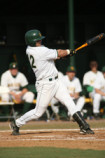Coaching the Forearm Wallslide
A deceptively simple exercise, the forearm wallslide delivers a huge ROI:
Would you have considered this?
I was asked today by the GA at the university I work at why I haven’t backed squatted the baseball or softball teams since they’ve been under my watch. My feelings are as follows: When you do the cost to benefit ratio of the movement (back squat), as any strength coach should do when programming, in my opinion there just isn’t enough benefit to outweigh the potential risk or cost I could potentially incur by selecting it. Understand that properly positioning the hands during a back squat requires a significant amount of shoulder external rotation (especially with close grips), and abduction of the humerus (especially with wide grips). Because either positioning pose a unique risk to the shoulder, the first anterior instability and the latter cranky rotator cuffs and biceps, I’m not about to roll the dice. Also consider that most overhead athletes possess some degree of labral damage, are at a higher risk for impingement, and possess less than stellar scapular upward rotation and thoracic mobility, and you’d have to be feeling pretty sassy to program the back squat. Note that I am working diligently to improve their structural shortcomings because I do intend for them to back squat at some point in their yearly preparation as, in my opinion, the back squat is king when trying to develop strong, powerful badunka-dunks and pork chords.
I think it’s important for those reading this post, whether you’re a young strength coach, or parent shopping around for the best training facility to send you’re little leaguer, to take note that there really is no such thing as an “insignificant detail” when attempting to develop the safest, most effective training program possible.
That's a picture of me hitting the pill a long way...or maybe I swang through it...at least I looked good...
Chris









